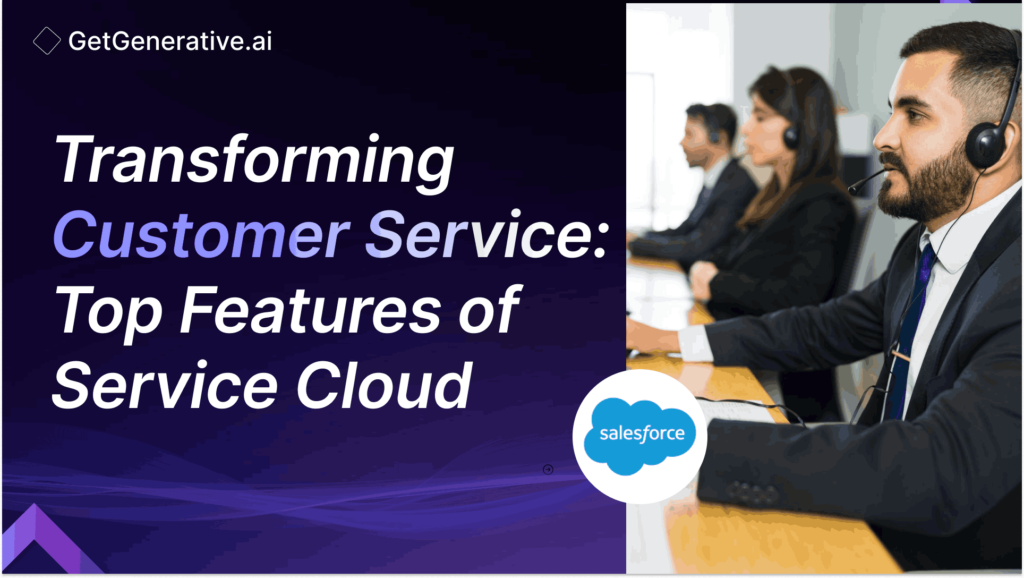Top Features of Salesforce Service Cloud
In today’s highly competitive business landscape, exceptional customer service is no longer a luxury—it’s a necessity. According to a recent study by Salesforce, 84% of customers say the company’s experience is as important as its products and services. To meet these rising expectations, businesses increasingly use advanced CRM solutions like Salesforce Service Cloud.
This blog will explore the essential features of Salesforce Service Cloud and how they can transform your customer service operations.
What is Salesforce Service Cloud?
Salesforce Service Cloud is a customer service platform enabling companies to manage customer queries and issues efficiently. Built on the Salesforce Customer 360 platform, it provides a unified view of every customer interaction, ensuring personalized service. Service Cloud integrates various tools and channels—such as email, social media, and phone—into a single platform, helping businesses deliver seamless customer experiences.
Key Features of Salesforce Service Cloud
1. Lightning Service Console
The Lightning Service Console is the heart of Salesforce Service Cloud. It provides a unified interface for agents to access all the tools and information they need to resolve customer issues efficiently. The console is highly customizable, allowing agents to view case histories, customer interactions, and knowledge articles in one place. This streamlined access to information drastically reduces the time spent switching between different systems, boosting agent productivity.
2. Case Management
Case management is a critical feature of Service Cloud, enabling agents to track and resolve customer issues from start to finish. Service Cloud allows cases to be automatically assigned based on predefined rules, ensuring that the right agent handles the problem. The platform also provides robust case-tracking capabilities, offering real-time insights into case status, resolution times, and customer satisfaction.
3. Omni-Channel Routing
Omni-Channel Routing is designed to automatically distribute customer inquiries to the most appropriate agents based on their skills and availability. This feature ensures that every customer query is handled properly and that agents are not overwhelmed with too many tasks. Omni-Channel Routing supports various communication channels, including email, phone, chat, and social media, allowing for a seamless customer experience.
4. Social Customer Service
In today’s digital age, customers expect support on social media platforms just as much as traditional channels. Salesforce Service Cloud integrates social media support, enabling agents to respond to customer queries and issues directly from platforms like Twitter, Facebook, and Instagram. This feature allows businesses to engage with customers in real time, improving customer satisfaction and loyalty.
5. Telephony Integration
Telephony Integration, often called CTI (Computer Telephony Integration), allows Service Cloud to integrate with telephone systems. This feature enables agents to make and receive calls directly within the Service Cloud platform. Additionally, it provides features like screen pop-ups with customer information, automatic call logging, and real-time call monitoring, all of which enhance the efficiency and effectiveness of customer service operations.
6. Automation with Macros
Automation is key to improving efficiency in customer service. Service Cloud’s Macros feature allows agents to automate repetitive tasks, such as sending standard responses or updating case statuses. By reducing the manual effort required for routine tasks, macros free up agents to focus on more complex customer issues, ultimately improving service quality and response times.
7. Knowledge Management
Knowledge Management is another powerful feature of Salesforce Service Cloud. It allows organizations to create and manage a repository of articles, FAQs, and documentation that agents can use to resolve customer issues quickly. The knowledge base is easily searchable, ensuring that agents can find the information they need when they need it. This feature not only improves first-call resolution rates but also helps in training new agents.
8. Custom Reports and Dashboards
Service Cloud offers robust reporting and analytics tools, allowing businesses to track key performance indicators (KPIs) and gain insights into customer service operations. Custom reports and dashboards provide real-time visibility into case resolution times, customer satisfaction scores, and agent performance. These insights enable managers to identify bottlenecks and make data-driven decisions to improve service quality.
9. Integration with Legacy Systems
One of the challenges many businesses face is integrating new CRM platforms with existing legacy systems. Salesforce Service Cloud offers seamless integration capabilities, allowing businesses to connect their existing databases, ERP systems, and other legacy software with Service Cloud. This ensures that all customer data is centralized and accessible, regardless of its originating system, providing a more holistic view of customer interactions.
10. Community Cloud Integration
Service Cloud integrates seamlessly with Salesforce Community Cloud, enabling businesses to create self-service portals and customer communities. These communities allow customers to find answers to their questions, submit service requests, and interact with other users without needing to contact a service agent. This not only reduces the workload on customer service teams but also empowers customers to solve problems on their own.
11. Service Cloud Voice
Service Cloud Voice is a relatively new feature integrating telephony directly into the Service Cloud platform. It provides agents with real-time transcription, AI-powered recommendations, and unified customer data, all within the same interface. This feature enhances the quality of customer interactions by providing agents with the tools they need to offer personalized, efficient service.
Also Read – Salesforce Service Cloud Implementation Guide
How Does the Lightning Service Console Enhance Agent Productivity?
The Lightning Service Console is designed to streamline the agent experience by providing all necessary tools and information in one interface. Agents can view customer data, case histories, and relevant knowledge articles without switching between different screens. The console also supports keyboard shortcuts and macros, further speeding up case resolution times. These features collectively enhance agent productivity, allowing them to handle more cases in less time.
What Are the Benefits of Using Workflow and Approvals in Salesforce Service Cloud?
Workflow and approvals in Salesforce Service Cloud automate routine tasks, such as case escalations, approvals, and notifications. This automation reduces the manual effort required from agents and ensures that processes are followed consistently. For example, if a case is not resolved within a specified time frame, it can be automatically escalated to a supervisor. This improves operational efficiency and ensures that customer issues are resolved promptly.
How Does Social Customer Service Work in Salesforce Service Cloud?
Social Customer Service in Salesforce Service Cloud integrates social media channels like Twitter, Facebook, and Instagram into the service platform. This allows agents to monitor and respond to customer inquiries directly from these platforms, all within the Service Cloud interface. Social media interactions are treated like any other case, with the same tools and tracking capabilities. This feature ensures businesses can engage with customers on their preferred platforms, improving customer satisfaction and brand loyalty.
Also Read – Salesforce Products Explained: The Ultimate Guide
Conclusion
Salesforce Service Cloud offers comprehensive features to enhance customer service operations. From the Lightning Service Console to Social Customer Service and Service Cloud Voice, these tools empower agents to deliver personalized, efficient, and effective support. As customer expectations continue to rise, adopting a robust CRM solution like Salesforce Service Cloud is crucial for businesses looking to stay competitive.
Enhance your Salesforce consulting with GetGenerative.ai. Effortlessly craft outstanding proposals, enabling you to dedicate more time to providing exceptional client service.
Start today!
FAQs
1. What is Salesforce Service Cloud?
Salesforce Service Cloud is a customer service platform that helps businesses manage customer inquiries and issues across multiple channels.
2. How does Omni-Channel Routing work?
Omni-Channel Routing automatically assigns customer inquiries to the most appropriate agents based on their skills and availability.
3. What is the Lightning Service Console?
The Lightning Service Console is a unified interface within Salesforce Service Cloud that provides agents with all the tools and information they need to resolve cases efficiently.
4. Can Service Cloud integrate with legacy systems?
Yes, Salesforce Service Cloud offers seamless integration capabilities with legacy systems, ensuring centralized access to customer data.
5. What is Service Cloud Voice?
Service Cloud Voice integrates telephony into the platform, offering real-time transcription, AI-powered recommendations, and unified customer data.




